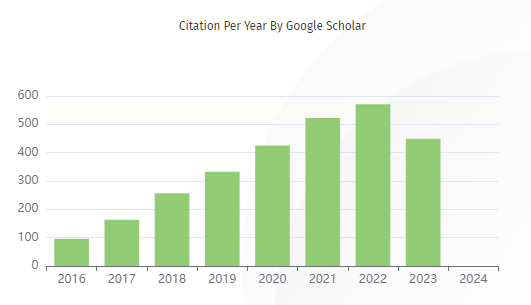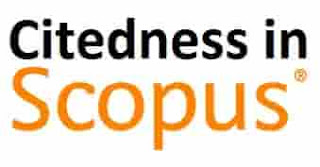Pengaruh Tingkat Adopsi IFRS dan Proteksi Investor terhadap Persistensi Laba: Analisis Lintas Negara Emerging Markets
DOI:
https://doi.org/10.12695/jmt.2016.15.3.7Keywords:
economics, accountingAbstract
Abstrak. Tujuan penelitian ini adalah untuk memberikan bukti empiris mengenai pengaruh tingkat adopsi IFRS dan proteksi investor terhadap persistensi laba. Dari penelitian terdahulu diketahui terdapat beberapa masalah yang ada pada praktik akuntansi di negara emerging market diantaranya sedikitnya akuntan yang memiliki kualifikasi yang bagus, ketidaklengkapan informasi akuntansi atau ketidaktepatan waktu dalam pembuatan laporan keuangan, kurangnya data akuntansi yang digunakan untuk tujuan internal manajemen, kurangnya undang-undang mengenai standar akuntansi, standar audit dan prosedur dan hal tersebut akan dapat mempengaruhi kualitas dari informasi akuntansi yang dilaporkan didalam laporan keuangan. Sehingga hal tersebut mendorong untuk meneliti lebih dalam mengenai faktor institusional yang berdampak pada persistensi laba perusahaan. Metode penelitian menggunakan data panel dengan jumlah observasi sebanyak 12.903 di emerging market pada tahun 2011 s.d 2013. Untuk mengukur tingkat adopsi IFRS menggunakan skor berdasarkan tiga tipe perbedaan tingkat adopsi masing-masing negara. Variabel dependen yang digunakan dalam penelitian ini yaitu persistensi laba. Proteksi investor menggunakan proksi strength of investor protection index dari World Bank. Hasil penelitian menunjukkan dalam konteks negara emerging market, tingkat adopsi IFRS tidak berpengaruh terhadap persistensi laba di masa yang akan datang. Di negara yang memiliki proteksi investor yang kuat berpengaruh pada semakin tingginya tingkat persistensi laba.
Kata kunci: tingkat adopsi IFRS, proteksi investor, persistensi laba, emerging markets, atribut laba.Â
Abstract. The purpose of this study is to provide empirical evidence about the effect of IFRS adoption and investor protection on earnings persistence. Based on prior studies, there are some problems that existed in the accounting practices in emerging markets such as less an accountant who have good qualifications, incomplete accounting information or inaccuracy of time in preparing financial statements, the lack of accounting data that are used for internal management incentives, the lack of legislation, auditing standards and procedure of accounting standards and this issues will can affect the quality of accounting information that reported in financial statements. So this view initiate to investigate extensively about the effect of institutional factors on earnigs persistence.This study uses panel data with 12.903 firm-year observations in emerging markets evidence from 2011 to 2013. To measure IFRS adoption uses score based on three distinctions of the type from IFRS adoption in respective countries. And then for dependent variable in this study is earnings persistence. While for the investor protection uses strength of investor protection index proxy from World Bank.The findings imply that in the context of emerging markets, IFRS adoption is not associated with future earnings persistence. While a stronger investor protection in the country significantly correlated with greater earnings persistence.
Keywords: IFRS adoption, investor protection, earnings persistence, emerging markets, properties of earnings.
Downloads
References
Ball, R., S. P. Kothari., & Ashok, R. (2000). The effect of international institutional factors on properties of accounting earnings. Journal of Accounting and Economics, 29, 1–51.
Barth, M. E., Wayne, L., & L. Mark. (2007). International accounting standards and accounting quality. [Working Paper]. Stanford University and University of North Carolina.
Barth, M. E., Wayne, L., Mark, L., & W. Christopher. (2012). Are IFRS based and US GAAP based accounting amounts comparable?. Journal of Accounting and Economics, 54, 68-93.
Bushman, R. M., Piptroski, J. D., & A. J. Smith. (2004). What determines corporate transparency?. Journal of Accounting Research, 42, 207–252.
Dahya, J., Orlin, D., & M. John. (2008). Dominant shareholders, corporate boards, and corporate value: A cross-country analysis. Journal of Financial Economics, 87, 73–100.
Daske, H., & G. Gebhardt. (2006). International financial reporting standards and experts perceptions of disclosure quality. A Journal of Accounting Finance and Business Studies, 42, 461-498.
Dechow, P. M., & Ilia, D. D. (2002). The quality of accruals and earnings: The role of accrual estimation errors. The Accounting Review, 77, 35-59.
Dechow, P. M., & Weili, G. (2006). The persistence of earnings and cash flows and the role of special items: Implication for the accrual anomaly. Published online in Springer Science Business Media, 11,253-296
DeFond, M. L., & Park, C. (2001). The reversal of abnormal accruals and the market valuation of earnings surprises. The Accounting Review, 76, 375–404.
DeFond, M. L., & Mingyi, H. (2007). Investor protection and analysts cash flow forecasts around the world. [Working Paper]. Leventhal School of Accounting Marshall and School of Business University of Southern California. Los Angeles, CA.
Dye, R. A., & Sunder, S. (2001). Why not allow FASB and IASB standards to compete in the U.S?. Accounting Horizons, 15, 257-271.
Emerald Journal. (2015). Emerging market countries. Retrieved from www.emeraldgrouppublishing.com/products/journals/news_story.htm?id=5802
Ewert, R., & Wagenhofer, A. (2005). Economic effects of tightening accounting standards to restrict earnings management. The Accounting Review, 80, 1101–1124.
Francis, J. R., Khurana, I. K., & R. Pereira. (2003). The role of accounting and auditing in corporate governance and the development of financial markets around the world. Asia Pacific Journal of Accounting and Economics, 10, 1–30.
Francis, J., Schipper, K., & Vincent, L. (2003). The relative and incremental explanatory power of earnings and alternative (to earnings) performance measures for returns. Contemporary Accounting Research, 20, 121-164.
Francis, J., & Wang, D. (2006). The joint effect of investor protection and big 4 audits on earnings quality around the world. Contemporary Accounting Research, 25, 1–39.
Hamdani, A., & Yishay, Y. (2013). Institutional investors as minority shareholders. Review of Finance, 17, 691-725
Hope, O. K., Justin, Y. J., & T. Kang. (2006). Empirical evidence on jurisdictions that adopt IFRS. Journal of International Accounting Research, 5, 1-20
Houqe, M. H., Tony, V. Z., Keitha, D., & A. K. M. Waresul. (2012). The effect of IFRS adoption and investor protection on earnings quality around the world. The International Journal of Accounting, 47, 333-355.
IFAC. (2007). The importance of IFRS convergence. Retrieved from http://www.ifrs.com/Backgrounder_Worldwide.html
John, K., Lubomir, L., & Y. Bernard. (2008). Corporate governance and risk-taking. Journal of Finance, 63, 1679-728.
Klapper, L. F., & L. Inessa. (2004). Corporate governance, investor protection, and performance in emerging markets. Journal of Corporate Finance, 10, 703-728.
LaPorta, R. F., Florencio, L., Andrei, S., & V. Robert. (1998). Law and finance. Journal of Political Economy, 106, 1113-1155.
LaPorta, R. F., Florencio, L., Andrei, S., & V. Robert. (2000). Investor protection and corporate governance. Journal of Financial Economics, 58, 3-27.
LaPorta, R. F., Florencio, L., Andrei, S., & V. Robert. (2002). Investor protection and corporate valuation. Journal of Finance, 57, 1147-70.
LaPorta, R. F., Lopez-De-Silanes, F., & S. Andrei. (2006). What works in securities laws?. Journal of Finance, 61, 1-32.
Leuz, C., Nanda, D., & P. D. Wyscocki. (2003). Earnings management and investor protection: An international comparison. Journal of Financial Economics, 69, 505-527.
Liu, J. D., & J. Thomas. (2002). Equity valuation using multiples. Journal of Accounting Research, 40, 135-172.
McNichols, M. F. (2002). Discussion of the quality of accruals and earnings: The role of accrual estimation errors. The Accounting Review, 77, 61-69.
Mikhail, M. B., B. R. Walther., & R. H. Willis. (2003). Reactions to dividend changes conditional on earnings quality. Journal of Accounting, Auditing & Finance (Greenwood Publishing Group Inc.), 18, 121-152
Mita, A. F. (2015). Pengaruh langsung tingkat adopsi IFRS terhadap home country bias dan pengaruh tidak langsungnya melalui daya banding laporan keuangan. [Disertasi]. Universitas Indonesia, Indonesia, Depok.
Munir, S., & Reza, J. (2010). Related-party transactions, family firms and firm performance: Some Malaysian evidence. Paper presented at Finance and Corporate Governance Conference 2011.
Nachrowi, N. D., & U. Hardius. (2006). Pendekatan Populer dan Praktis Ekonometrika untuk Analisis Ekonomi dan Keuangan. Jakarta. Lembaga Penerbit Fakultas Ekonomi Universitas Indonesia.
Nagar, N., & K. Sen. (2016). Earnings management in India; Managers fixation on operating profits. Journal of International Accounting Auditing and Taxation, 26, 1-12.
Narkatabtee, K,. & S. Patpanichchot. (2011). The impact of country-level and firm-level factors on the effectiveness of IFRS adoption: The case of European Union. International business and Economics Research Journal, 10, 79-92.
Park, Y. W., & H. H. Shin. (2004). Board composition and earnings management in Canada. Journal of Corporate Finance, 10, 431-457.
Reverte, C. (2008). Institutional differences in EU countries and their relationship with earnings management differences. Journal of Accounting and Organizational Change, 4, 182-200.
Samaha, K., & H. Khlif. (2016). Adoption of and compliance with IFRS in developing countries. Journal of Accounting in Emerging Economies, 6, 33-49.
Santos, M. A., Favero. L. P., & Distadio. L. F. (2016). Adoption of the international financial reporting standards (IFRS) on companies financing structure in emerging economies. Finance Research Letters, 16, 179-189.
Schipper, K., & Vincent, L. (2003). Earnings quality. Accounting Horizons. 17, 97-110.
Sloan, Richard. G. (1996). Do stock prices fully reflect information in accruals and cash flows about future earnings?.The Accounting Review, 71, 289-315.
Soderstrom, N., & Sun, K. (2007). IFRS adoption and accounting quality: A review. European Accounting Review, 16, 675-702.
Stubben, S. R. (2010). Discretionary revenues as a measure of earnings management. The Accounting Review, 85, 695-717.
Thai, Kriengkrai. B. U., Gary, K. M., & Sandep, N. (2006). Earnings attributes and investor protection: International evidence. The International Journal of Accounting, 41, 327-357.
Vichitsarawong, T., & Sompong, P. (2015). Do audit opinions reflect earnings persistence?. Managerial Auditing Journal, 30(3), 244-276.
Wardhani, R. (2009). Pengaruh proteksi bagi investor, konvergensi standar akuntansi, implementasi corporate governance, dan kualitas audit terhadap kualitas laba: Analisis lintas negara di asia. [Disertasi]. Universitas Indonesia, Indonesia, Depok.
Zeghal, D., Sonda, M., & M. Yosra. (2012). The effect of mandatory adoption of IFRS on earnings quality: Evidence from the Europian Union. Journal of International Accounting Research, 2, 1-25.
Downloads
Submitted
Accepted
Published
How to Cite
Issue
Section
License

This work is licensed under a Creative Commons Attribution-NonCommercial-ShareAlike 4.0 International License. Copyright @2023. This is an open-access article distributed under the terms of the Creative Commons Attribution-NonCommercial-ShareAlike 4.0 International License (http://creativecommons.org/licenses/by-nc-sa/4.0/) which permits unrestricted non-commercial used, distribution and reproduction in any medium.

















